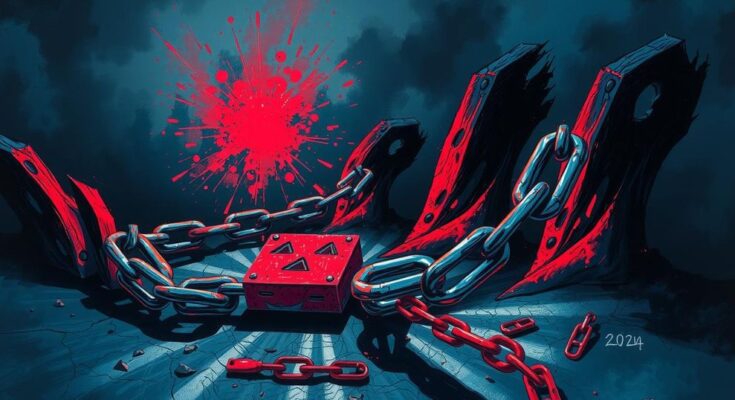The hijacking of the Jaffar Express by the BLA reveals the ongoing security threats in Pakistan, particularly in Balochistan and Khyber Pakhtunkhwa, where insurgency and terrorism have roots in the country’s historical policies. The political crisis following Imran Khan’s ousting showcases deep fractures within its democracy, revealing the self-inflicted nature of these challenges. A change in strategy is essential for sustainable stability.
The recent hijacking of the Jaffar Express by the Balochistan Liberation Army (BLA) has highlighted the unrest in Balochistan, a resource-rich region suffering from a protracted insurgency demanding greater autonomy. However, the internal threats to Pakistan extend beyond Balochistan, encompassing terrorism in Khyber Pakhtunkhwa and persistent political instability marked by frequent civil protests due to economic grievances. Pakistan’s situation bears resemblance to a creation turned against its maker; the country’s policies have fostered these very threats.
Balochistan faces a separatist insurgency rooted in decades of repressive governance. The region has experienced five armed uprisings since its contentious accession to Pakistan in 1948, yet the response from Islamabad has been consistent: a reliance on paramilitary force and enforced disappearances while neglecting to address economic disparities. Despite housing significant natural gas and mineral resources, Balochistan remains impoverished, exacerbating grievances amongst the population and fueling support for insurgent groups like the BLA. The military’s heavy-handed tactics have deepened resentment rather than resolving the crisis.
Khyber Pakhtunkhwa has witnessed intense policy blowback from Pakistan’s historical support for jihadist militancy. Beginning in the 1980s during the Soviet-Afghan War, Pakistan armed Islamist fighters, a strategy that led to the resurgence of militant groups like Tehrik-i-Taliban Pakistan (TTP). After 9/11, the country attempted to align with U.S. interests while maintaining ties with some jihadist factions, leading to the TTP’s declaration of war on the state in 2007. Despite military operations against the TTP, increased instability following the Taliban’s return to power in Afghanistan in 2021 has reignited violence across Pakistan.
In addition to insurgent threats, Pakistan faces a critical political crisis propelled by the arrest of former Prime Minister Imran Khan. Initially supported by the military, Khan’s subsequent removal and imprisonment have ignited mass protests, revealing profound divides within Pakistan’s fragile democratic framework. The military’s history of political manipulation has resulted in widespread public dissent, particularly following the crackdown on Khan’s Pakistan Tehreek-e-Insaf (PTI) party. This unrest has become a significant challenge for the state, threatening the stability it seeks to maintain.
The ongoing crises in Balochistan and Khyber Pakhtunkhwa, coupled with the political turmoil instigated by the events surrounding Imran Khan, illustrate the self-inflicted challenges Pakistan faces. The country’s past policies have shaped and now exacerbate these internal threats, leading to an existential crisis. A proactive and reconciliatory approach is urgently needed to mitigate these complex and interconnected issues.
In summary, Pakistan’s internal threats stem from a combination of historical policy failures, economic exploitation, and political miscalculations. The Balochistan insurgency and the turbulent situation in Khyber Pakhtunkhwa highlight the consequences of Islamabad’s reliance on force without dialogue. Additionally, the political unrest tied to Imran Khan’s removal underscores the fragile nature of democracy in Pakistan. The establishment’s tactics have not only failed to resolve these crises but have exacerbated public dissent, requiring a fundamental reevaluation of governance and policy strategies to restore stability.
Original Source: www.firstpost.com




